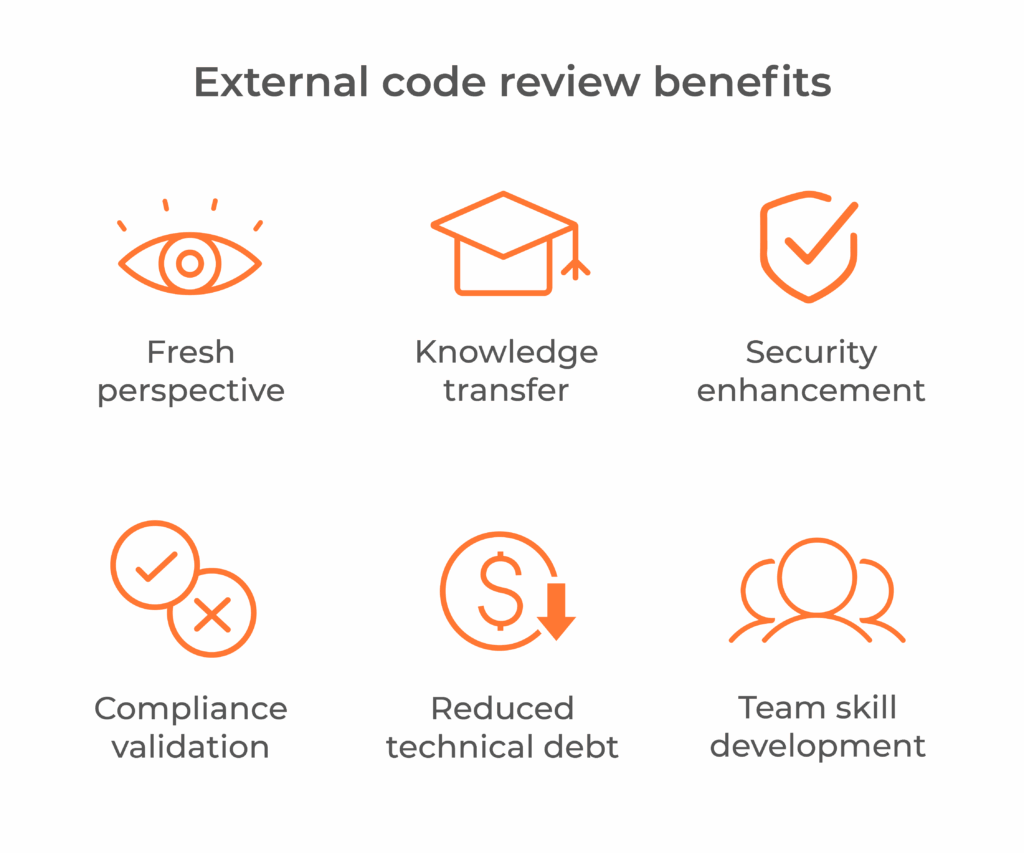When developers write code, they can miss problems in their own work. Just like having someone proofread your writing, having outside experts look at your code helps find issues you might not see. This article explains why getting code reviews from people outside your team is valuable.
We’ll cover what benefits these reviews bring, how they work, how to start using them, and answers to common questions. Whether you’re a small startup or a large company, you’ll learn practical ways to improve your software by getting fresh eyes on your code.
What is a code review?
A code review is a process in software development where one or more programmers examine another’s code to check for errors, bugs, or deviations from the project’s standards.
A good code review is not just about finding flaws in the code. It also provides constructive feedback that can be used to make improvements.
The main goal is to improve the quality of the software and make sure it’s easy to maintain in the future.
What is an external code review?
Internal code reviews happen when your team members check each other’s code. External code reviews bring in specialists from outside your company.
These outside experts can spot problems that your team might miss because they’re too close to the project. They see things with fresh eyes.
External code review looks at both what your code does and why you wrote it that way. Outside specialists evaluate your technology choices and how you implemented them.
They consider efficiency, scalability, usability, costs, and future development: all without the emotional attachment your team might have to the code they wrote.
Who needs external code review?
Smaller IT startups often don’t have much hiring experience. This can lead to problems with development practices, scalability, security issues, and architectural mistakes. When teams are rushing to finish sprints, they focus on making features work and might miss bigger concerns.
Larger enterprise IT companies often use outside help for specialized development needs. These more mature companies already understand the value of external code reviews and usually have good practices in place.
Why do you need external code review?
When internal and external reviewers check code and share their insights with developers, your company gains several benefits:
- Team members learn from each other and improve their skills
- People work together better
- Everyone follows the same coding standards
- Security improves through outside security checks
- Bugs are found early, before they cause problems

Common concerns
When considering external reviews, many teams and managers raise understandable concerns. Let’s address the most common objections and examine the data behind these issues.
“External reviews will slow down our development”
While reviews require some time investment, they typically save significant time by preventing rework and production issues. Teams implementing structured reviews generally see reduction in overall development time across the project lifecycle.
“Our team might feel criticized or demoralized”
Position external reviews as professional development opportunities rather than critiques. When properly framed, developers even improve confidence and skills after participating in expert code reviews.
“External reviews are too expensive”
Compare the cost of reviews against the expense of fixing production bugs, customer support, and reputation damage. Organizations typically see better ROI on external review investments through reduced maintenance costs and faster feature delivery.
“Outsiders won’t understand our unique business context”
Quality external reviewers adapt quickly to your domain while bringing valuable cross-industry perspectives. This combination often leads to innovative solutions that purely internal teams might never discover.
How external code review works
Many organizations wonder what happens during an external review and how it differs from internal reviews. Here’s a closer look at the structured approach that makes external reviews so effective.
The typical process includes:
Initial assessment: Reviewers analyze project scope and goals
Code examination: Systematic review of code against established standards
Documentation review: Evaluation of technical documentation completeness
Findings consolidation: Compilation of issues, risks, and recommendations
Collaboration session: Discussion with your team to explain findings and answer questions
External code review implementation tips
Moving from theory to practice requires a clear implementation strategy. Here’s how to effectively integrate external reviews into your development lifecycle to maximize their value.
Determine review scope: Decide whether to review the entire codebase or focus on critical components
Select review timing: Incorporate reviews at key development milestones rather than only at project completion
Prepare documentation: Gather requirements, architecture diagrams, and business logic explanations
Set expectations: Clarify with stakeholders what outcomes are expected from the review
Conclusion
External code reviews represent a strategic investment in your software’s quality and your organization’s future success. The evidence clearly supports their value across multiple dimensions.
As software continues to drive business value, ensuring its quality through expert, unbiased evaluation is not just a technical concern but a strategic business advantage.
Contact Setronica to book your free consultation. Our team of experts with over 25 years of development experience is ready to help you build more reliable, maintainable software.
FAQ
How does external code review contribute to code maintainability?
External code reviews significantly enhance the maintainability of software by ensuring that the code not only meets current functional requirements but is also written in a way that facilitates future updates and modifications.
External reviewers focus on the structure and readability of the code, advocating for best practices such as modular design and clean coding principles. This independent assessment helps to ensure that the codebase remains robust and adaptable, reducing the complexity and cost of future enhancements.
What role do external code reviews play in the agile development process?
In agile development environments, where rapid iterations and frequent updates are common, external code reviews play a vital role in providing a systematic evaluation that complements the fast-paced nature of agile projects.
They provide a structured feedback loop at critical milestones, helping to catch and rectify potential issues that could disrupt the continuous deployment cycle. By integrating external reviews periodically, teams can maintain a high level of code quality without compromising the agility and speed of development.
Can external code reviews help in achieving regulatory compliance for software development?
Yes, external code reviews are particularly valuable in projects that need to comply with specific regulatory standards such as GDPR for data protection, HIPAA for healthcare information, or PCI DSS for payment security.
External reviewers can provide an objective assessment of whether the software meets the stringent requirements set by these regulations. Their expertise and understanding of the legal aspects of software compliance can guide development teams in implementing necessary changes to ensure regulatory compliance effectively.
Chapters
- What is a code review?
- What is an external code review?
- Who needs external code review?
- Why do you need external code review?
- Common concerns
- How external code review works
- External code review implementation tips
- Conclusion
- FAQ



